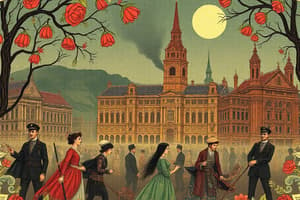Podcast
Questions and Answers
पहले विश्व युद्ध किस साल से किस साल तक था?
पहले विश्व युद्ध किस साल से किस साल तक था?
1914 से 1918 तक
पहले विश्व युद्ध की उत्पत्ति किस घटना से की जा सकती है?
पहले विश्व युद्ध की उत्पत्ति किस घटना से की जा सकती है?
ऑस्ट्रिया-हंगरी के अर्कड्यूक फ्रांज फर्डिनेंड की हत्या
किस तीन देशों के बीच एक गठबंधन था जिससे पहले विश्व युद्ध की उत्पत्ति हुई?
किस तीन देशों के बीच एक गठबंधन था जिससे पहले विश्व युद्ध की उत्पत्ति हुई?
जर्मनी, ऑस्ट्रिया-हंगरी, और सर्बिया
किस देश ने जर्मनी और ऑस्ट्रिया-हंगरी के साथ गठित संधि के बाद युद्ध किया?
किस देश ने जर्मनी और ऑस्ट्रिया-हंगरी के साथ गठित संधि के बाद युद्ध किया?
किस देश ने बेल्जियम आक्रमण करने के बाद उसके खिलाफ युद्ध किया?
किस देश ने बेल्जियम आक्रमण करने के बाद उसके खिलाफ युद्ध किया?
पहले विश्व युद्ध की अपेक्षाकृत लंबाई कितनी थी?
पहले विश्व युद्ध की अपेक्षाकृत लंबाई कितनी थी?
किस युद्ध के परिणामस्वरूप लगभग 9 मिलियन सैन्य मौतें और सरकारी नागरिकों के लगभग सात गुना अधिक मौतें हुईं?
किस युद्ध के परिणामस्वरूप लगभग 9 मिलियन सैन्य मौतें और सरकारी नागरिकों के लगभग सात गुना अधिक मौतें हुईं?
किस दिन हिटलर ने पोलैंड पर अभियान श्लीफेन योजना की शुरुआत की और जिससे द्वितीय विश्व युद्ध की शुरुआत हुई?
किस दिन हिटलर ने पोलैंड पर अभियान श्लीफेन योजना की शुरुआत की और जिससे द्वितीय विश्व युद्ध की शुरुआत हुई?
द्वितीय विश्व युद्ध के दौरान किस दिन विजय प्राप्त हुई?
द्वितीय विश्व युद्ध के दौरान किस दिन विजय प्राप्त हुई?
नाजी जर्मनी, इटली, जापान और सोवियत संघ ने किस देश के खिलाफ आक्रमणकारी विस्तारी नीतियों को अपनाया?
नाजी जर्मनी, इटली, जापान और सोवियत संघ ने किस देश के खिलाफ आक्रमणकारी विस्तारी नीतियों को अपनाया?
किन-किन शक्तियों के बीच द्वितीय विश्व युद्ध में एकमति शक्तियों का समूह बना जिसमें ब्रिटिश कॉमनवेल्थ बल, फ्री फ्रांस, संयुक्त राज्य और कई छोटे राष्ट्र शामिल थे?
किन-किन शक्तियों के बीच द्वितीय विश्व युद्ध में एकमति शक्तियों का समूह बना जिसमें ब्रिटिश कॉमनवेल्थ बल, फ्री फ्रांस, संयुक्त राज्य और कई छोटे राष्ट्र शामिल थे?
द्वितीय विश्व युद्ध ने किस मामूली महाद्वीप पर भारी लड़ाई की?
द्वितीय विश्व युद्ध ने किस मामूली महाद्वीप पर भारी लड़ाई की?
Flashcards are hidden until you start studying
Study Notes
History of the Worlds' Great Conflicts: A Brief Overview of the Two Major World Wars
The history of warfare is vast and complex, encompassing countless conflicts throughout human civilization. However, two significant events stand out in recent historical memory: the First and Second World Wars. These global conflicts had profound impacts on societies across the globe, shaping international politics, economic systems, and social structures well into our modern era. Let us delve into these historic battles that changed the course of world history forever.
Origins of the First World War
The outbreak of the First World War can be traced back to a series of alliances between European nations, particularly those involving Germany and Austria-Hungary. This web of treaties was designed to ensure mutual support if any one nation were attacked by another. In July 1914, Archduke Franz Ferdinand of Austria-Hungary was assassinated by a Serbian nationalist, leading Austria-Hungary to declare war on Serbia. As per their alliance with Austria-Hungary, Germany declared war on Russia and France, while Britain joined the conflict after Germany invaded Belgium—a neutral country with whom Britain had established a treaty guaranteeing its security. Thus began the First World War, also known as 'the Great War,' which lasted from 1914 to 1918.
Consequences of the First World War
The consequences of this protracted struggle were severe. It led to unprecedented loss of life, with estimates suggesting around 9 million military deaths and over seven times more civilian fatalities. Additionally, it left many territorial changes such as Alsace-Lorraine returning to French control, parts of Poland being created, new states being formed within former Ottoman lands, and parts of Africa becoming mandates under League auspices. Economically, it marked the beginning of a period of intense industrialization, making countries increasingly dependent upon each other for resources, goods, and services.
Causes and Course of the Second World War
Less than twenty years after the end of WWI, Europe was once again plunged into chaos. Tensions rose due to reparations imposed on Germany following her defeat in the previous war; subsequent economic hardships; political instability brought on by revolutions; a resurgence of militarism; and aggressive expansionist policies adopted by several major powers, notably Nazi Germany, Italy, Japan, and the Soviet Union.
On September 1st, 1939, Hitler launched Operation Schlieffen Plan against Poland, triggering what would become World War II. Unlike the first conflict, where multiple fronts existed from start to finish, the second saw different stages characterized by specific regions taking central roles during certain periods. Early on, it involved primarily eastern European nations before expanding westward, pitting the Allied Powers - comprising British Commonwealth forces, Free France, the United States, and numerous smaller nations - against the Axis powers of Germany, Italy, and Japan. There followed six years of brutal fighting spanning almost every continent until victory was finally achieved on May 7th, 1945.
Legacy of the Two World Wars
Both wars irrevocably altered the landscape of global politics. They served as catalysts for change in areas ranging from economics to diplomacy, science & technology, society structure, and even ideology. The creation of the United Nations and NATO reflects attempts globally to avoid future large scale conflicts through collective defense mechanisms. The development of nuclear weapons post-WWII fundamentally shifted power dynamics among superpowers - positing a real threat of complete annihilation should another conflict breakout. Despite some hopeful signs like improved transportation and communication infrastructure, enhanced medical practices, etc., these advances came at great cost - leaving millions dead and injured, cities destroyed, economies devastated - highlighting humanity's propensity towards self-destruction when driven by hatred, greed, ignorance, fear or ambition.
Studying That Suits You
Use AI to generate personalized quizzes and flashcards to suit your learning preferences.




